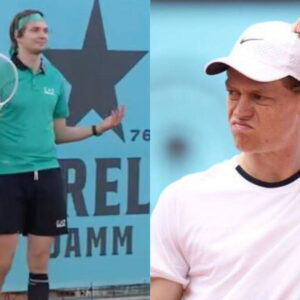What do you do if you don’t like the noise a crowd is making for your opponent? If you’re Aryna Sabalenka, you tell them to make it for you instead.
In last year’s US Open final, Sabalenka said the roar that the pro-American audience made for her opponent, Coco Gauff, was so loud that it “blocked my ears” and led to her error-filled breakdown. This year, after hearing the same crowd roar the same way for Jessica Pegula for more than an hour, Sabalenka decided to ask—demand, actually—for some of that love for herself. The New York fans, who will never turn down a request to make themselves heard, obliged.
That may not have been the reason that Sabalenka eventually beat Pegula in two tight, entertaining, slam-bang 7-5, 7-5 sets for her third Grand Slam title. But it was another sign, among many, of the 26-year-old’s long-running evolution as a player and person. Instead of hanging her head and letting the crowd shout her down, she stayed loose, had some fun with the situation, and made it feel a little less oppressive.
“I heard a lot of support,” Sabalenka said during the trophy ceremony afterward. “You were cheering me on in those good moments.”
Sabalenka dropped just one set in seven matches in New York, but she more than earned her first US Open title. Since 2021, she had lost in the semifinals twice and the final once at Flushing Meadows, and each defeat had been a heartbreaker. First, she went out to little-known Leylah Fernandez 6-4 in the third set. Then she lost to Iga Swiatek after being up 4-2 in the third. Finally, she collapsed again Gauff after winning the first set, and chucked two of her racquets into a locker-room garbage can. Each time, it was Sabalenka’s own emotions, as much as her opponent’s skill, that sealed her fate.
This weekend, that same fate seemed to await her on three different occasions.
In her semifinal against another American, Emma Navarro, Sabalenka let a second-set lead slip, then fell behind in the tiebreaker. She stared at her team. She rolled her eyes. She banged her racquet on the court. But just when another meltdown appeared imminent, she gathered herself, stopped ranting, and closed Navarro out with mistake-free tennis.
“I was, like, ‘No, no, no, Aryna, it’s not going to happen again,’” she said after beating Navarro. “You have to control your emotions. You have to focus on yourself.”
“I’m really glad that the lessons [were] learned.”

“I know that I have to go for it,” Sabalenka said. “That’s the only way it works for me.”
© Matt Fitzgerald

“Every time I see my name on that trophy, I’m so proud of myself, I’m proud of my family that they never gave up on my dream and that they were doing everything they could to keep me going.”
© Matt Fitzgerald





